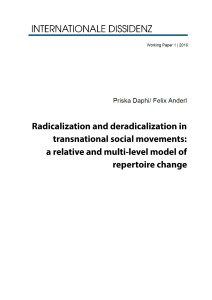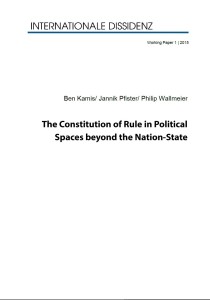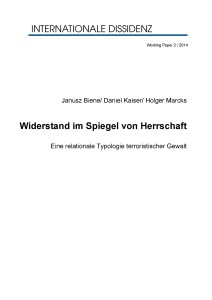A series of working papers presents the latest research from the different “International Dissidence” projects.
 While repertoires are a common concept in social movement studies, little is known about how changes in repertoires occur. When do activists change protest tactics? Why do some innovations stick and others do not? This conceptual paper proposes a relative and multi-level approach to analysing changes in repertoires addressing shortcomings in existing research on radicalization and social movement repertoires. Focussing on transnational activism we propose, on the one hand, to define radicalization and deradicalization as processes of change relative to existing repertoires, which do not necessarily include violence. On the other hand, we argue drawing on examples from the Global Justice Movement that these processes are crucially shaped by the interplay of different factors at the local, national, and transnational level. Processes of radicalization and deradicalization depend on the combination of factors such as opportunity structures, protest cycles, relational dynamics, and political learning at these three levels. Download PDF here
While repertoires are a common concept in social movement studies, little is known about how changes in repertoires occur. When do activists change protest tactics? Why do some innovations stick and others do not? This conceptual paper proposes a relative and multi-level approach to analysing changes in repertoires addressing shortcomings in existing research on radicalization and social movement repertoires. Focussing on transnational activism we propose, on the one hand, to define radicalization and deradicalization as processes of change relative to existing repertoires, which do not necessarily include violence. On the other hand, we argue drawing on examples from the Global Justice Movement that these processes are crucially shaped by the interplay of different factors at the local, national, and transnational level. Processes of radicalization and deradicalization depend on the combination of factors such as opportunity structures, protest cycles, relational dynamics, and political learning at these three levels. Download PDF here
WP #1/2015 Ben Kamis/ Jannik Pfister/ Philip Wallmeier: The Constitution of Rule in Political Spaces beyond the Nation-State
 Recent contributions to theorizing rule beyond the nation-state, mostly focusing on institutionalization through concepts like ‘order’ or ‘regime’, pay little attention to spatialization even though space played such an important role in conceptualizing rule within the nation-state. In this working paper, the authors propose a perspective that shows the concrete benefits of studying rule by looking at space. They argue that existing contributions to theorizing political space beyond the nation-state only cover some of its aspects, focusing on loyalties and identities. The concept of third space can be translated from political geography to account for the constitution of embodied practices in space as an important aspect of rule. The authors show how many aspects of political space defy cartographical mapping, and how similarly many forms of rule defy an easy institution-based description. Only focusing on the constitution of space through practices makes rule visible in its spatialization.
Recent contributions to theorizing rule beyond the nation-state, mostly focusing on institutionalization through concepts like ‘order’ or ‘regime’, pay little attention to spatialization even though space played such an important role in conceptualizing rule within the nation-state. In this working paper, the authors propose a perspective that shows the concrete benefits of studying rule by looking at space. They argue that existing contributions to theorizing political space beyond the nation-state only cover some of its aspects, focusing on loyalties and identities. The concept of third space can be translated from political geography to account for the constitution of embodied practices in space as an important aspect of rule. The authors show how many aspects of political space defy cartographical mapping, and how similarly many forms of rule defy an easy institution-based description. Only focusing on the constitution of space through practices makes rule visible in its spatialization.
WP #2/2014 Janusz Biene/ Daniel Kaiser/ Holger Marcks: Reflections of Rule in Resistance. A Relational Typology of Terrorist Violence
 Under what conditions can violent dissidence mobilize social support? Particularly in the case of terrorist violence, a form of resistance generally deemed to be disreputable, this may be hardly comprehensible. Indeed, common concepts in terrorism research, as the effectiveness or success of terrorist actors, are incapable of adequately answering this question. On the one hand, effects of terrorism can be comprehensive and nevertheless detrimental to the influence of the group. On the other hand, success is usually measured by the achievement of political ends, even though terrorism serves foremost as a strategic way to gain influence. Therefore, the authors put forward the concept of “political influence” (politische Wirkungsmacht), which allows us to take into account the relativity of power and to investigate whether actors are able to mobilize resources in order to promote their cause. This necessitates to adopt a relational perspective, thus, considering the interplay of dissident actor, opponent and the group to be mobilized. The authors argue it is crucial for mobilization that the terrorist group and its potential constituency intersubjectively share the same perception of rule to be contested. Ideal-typically they distinguish between territorialized and socio-structured perceptions of rule. Both are mediated by identity and, as such, condition not only which targets the terrorist group attacks but also if the potential constituency can be activated by the conflict. Terrorists’ gain of political influence, the authors conclude, necessitates that the potential constituency identifies the victims of terrorist violence as agents of a ruling system perceived to be illegitimate. This is particularly likely if a territorialized perception of rule persists since this implies an alienation from the attacked entity and its members. This argument is illustrated with reference to historical and recent cases of terrorist violence. Download here (PDF in German)
Under what conditions can violent dissidence mobilize social support? Particularly in the case of terrorist violence, a form of resistance generally deemed to be disreputable, this may be hardly comprehensible. Indeed, common concepts in terrorism research, as the effectiveness or success of terrorist actors, are incapable of adequately answering this question. On the one hand, effects of terrorism can be comprehensive and nevertheless detrimental to the influence of the group. On the other hand, success is usually measured by the achievement of political ends, even though terrorism serves foremost as a strategic way to gain influence. Therefore, the authors put forward the concept of “political influence” (politische Wirkungsmacht), which allows us to take into account the relativity of power and to investigate whether actors are able to mobilize resources in order to promote their cause. This necessitates to adopt a relational perspective, thus, considering the interplay of dissident actor, opponent and the group to be mobilized. The authors argue it is crucial for mobilization that the terrorist group and its potential constituency intersubjectively share the same perception of rule to be contested. Ideal-typically they distinguish between territorialized and socio-structured perceptions of rule. Both are mediated by identity and, as such, condition not only which targets the terrorist group attacks but also if the potential constituency can be activated by the conflict. Terrorists’ gain of political influence, the authors conclude, necessitates that the potential constituency identifies the victims of terrorist violence as agents of a ruling system perceived to be illegitimate. This is particularly likely if a territorialized perception of rule persists since this implies an alienation from the attacked entity and its members. This argument is illustrated with reference to historical and recent cases of terrorist violence. Download here (PDF in German)
WP #1/2014 Christopher Daase/ Nicole Deitelhoff: Reconstructing Global Rule by Analyzing Resistance
Existing approaches to researching rule on a global level are too limited to grasp its multifaceted forms. For the most part, liberal approaches in International Relations equate rule and legitimate authority, while critical approaches can only conceive of them as domination or hegemony. In order to make conceivable both illegitimate coercion and legitimate orders in international politics, in this Working Paper Christopher Daase and Nicole Deitelhoff propose reconstructing rule by analyzing practices of resistance. With the continuum between opposition (complying to the rules of the game) and radical dissidence, they develop a heuristic that makes it possible to describe the plurality of forms of rule in differentiated partial orders of international politics beyond anarchy, authority and hegemony: as structures of institutionalized superordination and subordination through which basic goods and influence are distributed, alternativeness and contingency are minimized and expectations are stabilized. Download the PDF



